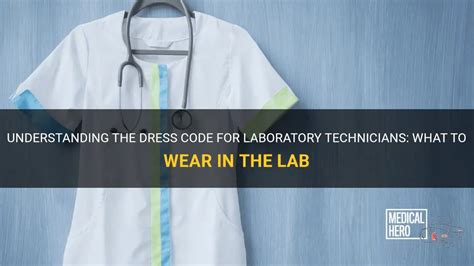Working in a laboratory setting requires a unique blend of style and functionality. While lab coats and goggles may be the first things that come to mind, a lab tech's overall dress code is crucial for ensuring safety, professionalism, and productivity. In this article, we'll delve into the world of lab tech fashion, exploring the dos and don'ts of dressing for success in the lab.
Importance of Dress Code in the Lab
A lab tech's attire plays a significant role in maintaining a safe and healthy working environment. Loose clothing, open-toed shoes, and jewelry can all pose hazards when working with chemicals, biological agents, or medical equipment. Moreover, a well-dressed lab tech exudes professionalism and confidence, which is essential for interacting with colleagues, patients, and supervisors.
Lab Tech Dress Code Essentials
So, what should you wear to work in a lab? Here are the essentials:
- Lab Coats: A lab coat is a must-have for any lab tech. It protects your clothing from chemicals, biological agents, and other substances you may encounter during the day. Choose a coat made from a durable, easy-to-clean material like cotton or polyester.
- Comfortable Shoes: Good footwear is vital for lab techs, who often spend long hours on their feet. Opt for closed-toe, non-slip shoes that are easy to clean and provide adequate support.
- Scrubs or Lab Attire: Scrubs or lab-specific attire are popular choices for lab techs. These garments are designed to be comfortable, durable, and easy to clean. Look for tops and bottoms made from breathable fabrics like cotton or polyester.
- Minimal Jewelry: Avoid wearing loose jewelry that could get caught in equipment or pose a hazard when working with chemicals. Stick to simple, understated pieces like a watch or wedding band.
- Hair Tied Back: Keep your hair tied back and away from your face to prevent it from getting in the way of your work. This is especially important when working with chemicals or biological agents.

Additional Tips for Lab Tech Dress Code
While the essentials are a great starting point, here are some additional tips to help you dress for success in the lab:
- Dress for the Task: Consider the specific tasks you'll be performing during the day and dress accordingly. For example, if you'll be working with chemicals, wear a lab coat and protective gloves.
- Keep it Clean: Make sure your attire is clean and free of contaminants. This is especially important when working with biological agents or medical equipment.
- Layer Up: Wearing layers can help you adjust to changing temperatures in the lab. Opt for lightweight, breathable fabrics that can be easily removed if needed.
- Avoid Loose Clothing: Avoid wearing loose clothing that could get caught in equipment or pose a hazard when working with chemicals.
Lab Tech Dress Code Policy
Many laboratories have specific dress code policies in place to ensure safety and professionalism. Here are some key elements to include in your lab tech dress code policy:
- Clear Guidelines: Establish clear guidelines for what is and isn't acceptable attire in the lab. This should include specific examples of prohibited items, such as open-toed shoes or loose jewelry.
- Enforcement: Make sure supervisors and colleagues are aware of the dress code policy and are empowered to enforce it.
- Training: Provide training on the importance of dress code and how it contributes to a safe and healthy working environment.

Common Mistakes to Avoid
While dressing for success in the lab may seem straightforward, there are several common mistakes to avoid:
- Wearing Open-Toed Shoes: Open-toed shoes are a hazard in the lab, as they can expose your feet to chemicals and biological agents.
- Wearing Loose Jewelry: Loose jewelry can get caught in equipment or pose a hazard when working with chemicals.
- Not Wearing a Lab Coat: A lab coat is essential for protecting your clothing from chemicals, biological agents, and other substances you may encounter during the day.
Conclusion
Dressing for success in the lab requires a unique blend of style and functionality. By following these guidelines and avoiding common mistakes, you can ensure a safe and healthy working environment while exuding professionalism and confidence. Remember, your attire is an important part of your overall performance as a lab tech, so make sure you're dressing for success.






What is the most important aspect of a lab tech's dress code?
+Safety is the most important aspect of a lab tech's dress code. A lab tech's attire should prioritize safety and protection from chemicals, biological agents, and other substances they may encounter during the day.
Can lab techs wear open-toed shoes in the lab?
+No, lab techs should not wear open-toed shoes in the lab. Open-toed shoes can expose feet to chemicals and biological agents, posing a hazard to the lab tech's safety.
Why is it important for lab techs to wear a lab coat?
+A lab coat is essential for protecting a lab tech's clothing from chemicals, biological agents, and other substances they may encounter during the day. It also helps to maintain a professional appearance and prevent cross-contamination.
